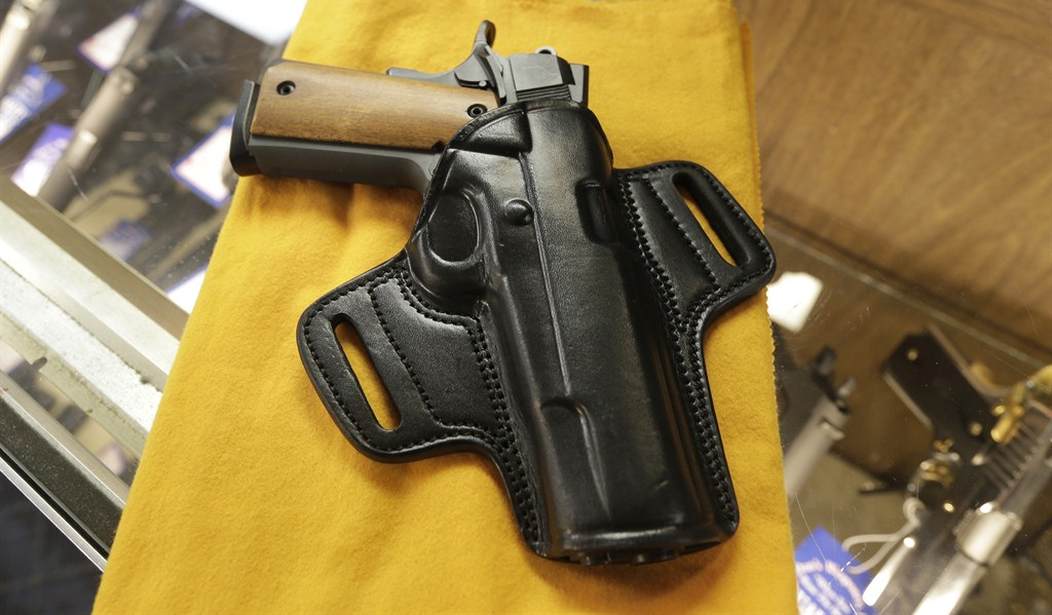Remember the friendly police officer from Ohio who thanked a couple for having their concealed carry permits following a routine traffic stop? Well, it seems any out-of-state concealed carry permit holder will be recognized in the Buckeye State, even to those who live in states without reciprocity agreements (via Cuyahoga County Sheriff's Office) :
A person who is temporarily in Ohio and has a valid concealed handgun license issued from another state, regardless of whether the other state has entered into a reciprocity agreement with the Attorney General, that out-of-state license will be recognized in Ohio during the time that the person is temporarily in Ohio.
The new law actually went into effect on March 23, but it also includes a more rigorous background check process. Yet, it also allows hunters to use suppressors, alters the definition of an automatic weapon, and loosens regulations on buying ammunition. Of course, the pro-gun control crowd wasn’t happy when this law passed last month (via Columbus Dispatch):
A new state law … will allow hunters to use suppressors on guns; permit Ohioans to buy rifles, shotguns and ammunition from any state; and implement a more-rigorous background check for concealed-carry permits.It also reduces the training required to get one of those permits from 12 hours to eight, including some of it online for the first time; changes the definition of an “automatic” weapon; and makes concealed-carry permits issued from other states valid in Ohio, even without a reciprocity agreement.
“This is a very comprehensive bill,” said Jim Irvine, chairman of the Buckeye Firearms Association. “Over time, people will look back and see this as a watershed law that fixed a lot of little things.”
Jennifer Thorne, executive director of the Ohio Coalition Against Gun Violence, sees things differently. “There are a number of troubling provisions in the bill,” she said. “There’s nothing for us to celebrate in this bill.”
Thorne said, “Elected officials could have done better for Ohio. It reduces training and there is an expansion of reciprocity.”
“Everyone who is carrying a gun is a good guy up until the moment they aren’t,” she said.
Recommended
Oh my, where to go with that statement? So, all gun owners are potential criminals? John Lott of the Crime Prevention Research Center took this hypothesis to the woodshed last year when the Violence Prevention Center issued the “Concealed Carry Killers” report. He used the Michigan data to point out the flaws [emphasis mine]:
Now a look at the murder and manslaughter statistics as presented by the Violence Policy Center report. These cases would surely be relevant, but they are not counted correctly. This is how the Michigan State Police report the numbers:
- 2007–08: Pending 5, Convicted 0
- 2008–09: Pending 0, Convicted 1
- 2009–10: Pending 1, Convicted 2
- 2010–11: Pending 5, Convicted 4
- 2011–12: Pending 3, Convicted 4
- Total: Pending 14, Convicted 11
In other words, during 2007–08, five cases were pending and there were no convictions. The Violence Policy Center makes several fundamental mistakes. First, it can’t add simple numbers up correctly. While the VPC claims 20 pending cases and 14 convictions, the Michigan State Police report a total of 14 and 11 cases respectively.
Secondly, since it can take years for a murder case to go to trial, some of the homicides may have occurred well before 2007. In addition, the Michigan State Police report doesn’t provide information on how the murder was committed, so gun murders make up only a portion of this total.
Third, and perhaps the worst mistake, the Violence Policy Center actually adds the “pending” and “conviction” numbers together. Convictions are obviously what should be counted. After all, some of the “pending” cases do not result in a conviction, and adding them more than doubles the total number.
…
Yet, put aside all these problems for a moment. Assume, for the sake of argument, that the Violence Policy Center’s claim that concealed-handgun permits were responsible for 636 deaths in seven years is correct. One has to note that there are over 11 million concealed-handgun permits in the U.S. right now. With an annual number of deaths of 90, that means 0.00083 percent of concealed-carry permit holders were responsible for a shooting death each year. Removing suicides from the total reduces the rate even more, to 0.00058 percent
In 2011, he used Texas and Florida as examples to further his claims that concealed carry holders are not harbingers of crime; he used Texas and Florida since they “provide detailed records on the behavior of permit holders.”
During over two decades, from October 1, 1987 to February 28, 2011, Florida has issued permits to over 1.96 million people, with the average person having a permit for more than a decade. Few -- 168 (about 0.01%) -- have had their permits revoked for any type of firearms related violation, the most common was accidentally carrying a concealed handgun into a gun-free zone such as a school or an airport, not threats or acts of violence.Over the last 38 months, only four permit holders have had their permit revoked for a firearms related violation -- an annual revocation rate of 0.0003%. The numbers are similarly small in Texas. In 2009, there were 402,914 active license holders. 101 were convicted of either a misdemeanor or a felony, a rate of 0.025 percent, with only few of these crimes involving a gun.
Regardless, good on Ohio for expanding our Second Amendment rights.
(H/T Truth About Guns)

























Join the conversation as a VIP Member